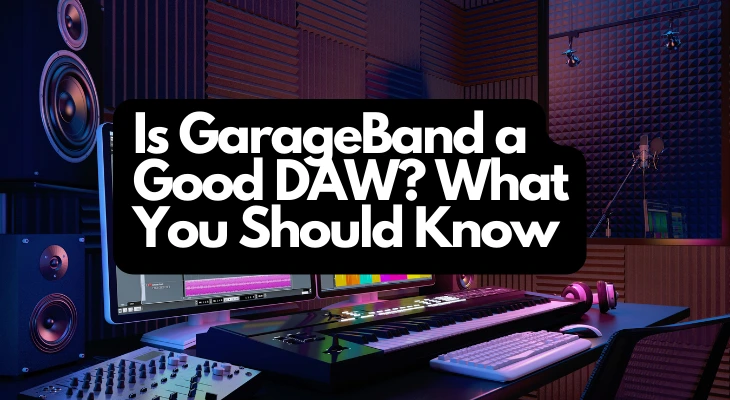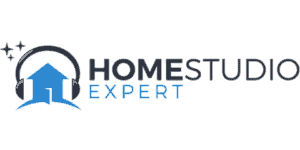When it comes to composing and producing professional-quality pieces of music, finding the right DAW is essential. GarageBand has been an industry titan for years thanks to its ease of use and the fact that it’s totally free. But is it worth your time, or should you look into some better alternatives?
GarageBand is still a good and viable DAW for composers of all experience levels, and it’s cheaper than almost every other DAW available. However, much higher-quality DAWs on the market, such as Cakewalk, Cockos Reaper, and Magix Musicmaker, are competitively priced and come with even more features.
We’ll break down GarageBand’s benefits and drawbacks to help you decide if it’s time to move on to another DAW or if you should continue using it for your music composition endeavors. We’ll also explore a few alternatives to the software to try if you’re looking for something new.

Is GarageBand Still Worth Using as a DAW?
GarageBand has a reputation of being an entry-level DAW software for total beginners, but it’s actually a fairly high-quality option for expert and novice composers alike. Don’t be wary of its low price tag, as it offers a wide range of valuable features and has a brilliantly user-friendly interface.
However, you may be growing a bit bored with GarageBand and interested in finding a similar DAW that’s inexpensive, easy to use, and viable in a professional setting. In that case, it might be worth looking into some alternatives. It’s important to note that GarageBand is only compatible with Macs, so PC and Linux users are unfortunately out of luck if they want to use the software with ease.
When GarageBand was initially launched, it was one of the only free DAWs available to beginner composers. Today, there are dozens of great free or inexpensive DAWs with easy-to-use interfaces and features that have begun to eclipse GarageBand in popularity–for many reasons. And since most of them are compatible with multiple operating systems, they’re more accessible for PC and Linux users.
So, is it still worth using? It depends on your personal preferences, operating system, and budget. Let’s break down some of GarageBand’s features into pros and cons to help you make that decision.
GarageBand: Pros and Cons
You might be surprised to learn GarageBand is still quite popular nowadays, even with professional musicians! That’s because it has remained a solid competitor for today’s wide range of DAWs at both similar and more expensive price points.
The best way to decide if GarageBand is right for you is to look at its benefits and drawbacks in depth. Although this free and well-known DAW software remains an industry giant, it isn’t for everyone, and you may want to move on to a different DAW if GarageBand no longer suits you.
GarageBand: Pros
Perhaps the most obvious benefit of GarageBand’s software is that it is completely free to use if you have a Mac. Since it’s built into most Mac machines, you won’t even have to download it! When it initially launched, this was practically unheard of in the music production industry, and the software still proudly boasts this feature.
Another great thing about GarageBand is its super user-friendly interface. If you’re a beginner learning how to use a DAW for the first time, you’ll have no issues interacting with the software’s clean, neat, and superbly well-designed UI. While many other similar DAWs look cluttered and confusing, GarageBand is a breeze to work with.
You also won’t need to worry about scrambling to find samples or loops to play around with while recording and creating your own music, as GarageBand comes with a massive library of great samples and instruments you can use. From pianos to organs to electric guitars and many more, you’ll have a plethora of instruments to experiment with.
Also, the software comes with plenty of useful plug-ins you can use to make creating and polishing your music compositions straightforward, even if you don’t have much prior experience with using a DAW for this purpose. It’s also compatible with plenty of third-party plug-ins.
Finally, the software is amazingly versatile. It allows you to record up to 255 tracks, and although it doesn’t have a proper mixer, you can use its built-in arrangement window as a rudimentary mixing interface. So it’s got all the tools you need for basic mixing and mastering.
GarageBand: Cons
Unfortunately, GarageBand has gained a bit of a reputation for being a “watered down” version of much better DAWs on the market, and this hasn’t happened for no reason.
The most obvious drawback is its lack of functionality with any operating systems other than Macs. However, if you want to use this software with a PC or Linux machine, it isn’t necessarily impossible. Still, it will take a significant amount of tech knowledge and modifications to run correctly. However, many versatile DAWs on the market that are either free, such as Cakewalk, or very inexpensive, such as Cockos Reaper, work perfectly on multiple operating systems.
Plus, as we briefly touched on above, GarageBand lacks a comprehensive mixing interface. Its arrangement window has many similar features as a mixer, but it is pretty limited and rudimentary in function, which might turn off more experienced composers from using the software.
Although GarageBand’s user interface is very clean and straightforward, many expert composers may find it to be a bit too stripped down and basic for their tastes. In addition, while the software is straightforward to learn how to use, it lacks some of the more intricate and complex settings provided by more elaborate and professional DAWs.
In short, GarageBand is a fantastic software oriented towards beginner composers and producers who are just starting to learn how to use a DAW for the first time. Still, it lacks functionality and versatility compared to other similar DAWs on the market.
So, what are your alternatives? Next, let’s look into some DAWs that you might find more appealing than GarageBand.
Free and Inexpensive DAW Alternatives to GarageBand
Once upon a time, GarageBand used to be one of the only free or cheap DAWs available to composers on a budget. It dominated the industry for many years, but over the past decade or so, many worthy competitors have emerged appealing to composers of any skill level.
Cakewalk
If you’re looking for a Windows-compatible DAW that is as similar to GarageBand as possible, Cakewalk is the perfect solution. The software has most of the same features and is totally free, making it an ideal DAW for Windows users looking to dip their toes into the world of music production without having to break the bank.
Cakewalk is a wonderfully well-rounded DAW for producers and composers of all skill levels. It includes various built-in instruments and effects for you to use, and it’s also compatible with most third-party plugins.
Cockos Reaper
Although this DAW isn’t free like Cakewalk or GarageBand, it is very reasonably priced and accessible to composers on a budget. It’s a good middle-ground for users somewhere between beginner and expert level, and its interface and features are very user-friendly and well designed.
The software comes with loads of effects and unlimited audio tracks, though it lacks any built-in instruments. However, for only $60, it’s far cheaper than its competitors, and it boasts a wide range of features and works great with third-party plugins.
Magix Musicmaker
Here’s another excellent software that is compatible with all major operating systems. In addition, it’s free and comes bundled with loads of instruments and plugins, making it a powerful, versatile DAW accessible to any budget.
It also comes with a collection of resources Magix has dubbed the “SoundPool,” which is essentially a vast selection of samples and loops you can use at no extra charge. No gimmicks or catches here; all of Magix Musicmaker’s great features are free!
While some more experienced composers may find it a bit basic for their tastes, you’ll still be able to get plenty of use out of the software risk-free regardless of whether you’re a total beginner or a seasoned expert.
Conclusion
GarageBand has remained a prominent DAW in the music production industry for many years. It still is a perfectly viable software for much of your composition, mixing, and mastering needs, despite its minor drawbacks.
However, depending on your level of experience, operating system, budget, and preferences, you may want to look into something a bit more complex and versatile, such as the three great alternatives we’ve listed above.
Sources
- Andyax Music: Is GarageBand Used By Professional Musicians?
- Home Music Producer: Is GarageBand Good For Making Music?
- Make Use Of: 9 Reasons GarageBand Is the Best DAW for Beginners on macOS
- PCMag: Apple GarageBand (for Mac) Review
- ProducerHive: 5 GarageBand Alternatives For Windows
- Producer Society: Can Garageband be Used Professionally? Yes, It Can
- ProducerSphere: The 5 Best FREE Garageband Alternatives for Windows (2021)
- Rolling Stone: Inside Garageband, the Little App Ruling the Sound of Modern Music
Recent Posts
QuickTime is a vital app for many Mac users, and if you’ve recently bought a new microphone, you might wonder how to use it optimally. QuickTime cannot record audio content if it doesn’t have...
Every microphone leaves a unique signature on the quality of its output. If you’re a podcaster trying to melt your way into your audience’s hearts, a muddy, distorted recording won’t cut it....
